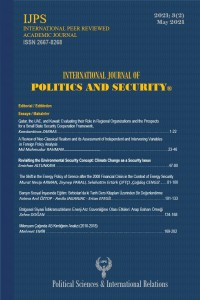A Review of Neo-Classical Realism and its Assessment of Independent and Intervening Variables in Foreign Policy Analysis
Abstract
How do states assess international threats? Who decides the foreign policy alternatives? To what extent can domestic actors bargain with state leaders and influence foreign policies? These are the common questions that are faced by foreign policy administrators in any country and Bangladesh is not an exception. Neoclassical Realism (NCR) answers these common questions by filtering international imperatives through state structure. NCR helps top officials to assess probable threats, identify feasible strategies in response to those threats and extract and mobilize the societal resources necessary to implement and sustain those strategies. That’s why the advocates of NCR claim it as the theory of foreign policy. This paper identified this theory to distinguish it as a logical extension and necessary part of advancing neo-realism as well as a theory of international relations that is more prone to analyzing states’ foreign policy. The focus has been to discuss what NCR incorporates by saying independent and intervening variables to be considering issues in foreign policy analysis. The paper has been based on extensive literature reviews especially the review articles of Gideon Rose and Brian Rathbun and the scholars who contributed to the area of foreign policy.
Keywords
neoclassical realism independent and intervening variables foreign policy analysis neorealism
References
- Associate Professor Dr. Özlem Kaygusuz Department of International Relations Ankara University Ankara, Turkey
A Review of Neo-Classical Realism and its Assessment of Independent and Intervening Variables in Foreign Policy Analysis
Abstract
How do states assess international threats? Who decides the foreign policy alternatives? To what extent can domestic actors bargain with state leaders and influence foreign policies? These are the common questions that are faced by foreign policy administrators in any country and Bangladesh is not an exception. Neoclassical Realism (NCR) answers these common questions by filtering international imperatives through state structure. NCR helps top officials to assess probable threats, identify feasible strategies in response to those threats and extract and mobilize the societal resources necessary to implement and sustain those strategies. That’s why the advocates of NCR claim it as the theory of foreign policy. This paper identified this theory to distinguish it as a logical extension and necessary part of advancing neo-realism as well as a theory of international relations that is more prone to analyzing states’ foreign policy. The focus has been to discuss what NCR incorporates by saying independent and intervening variables to be considering issues in foreign policy analysis. The paper has been based on extensive literature reviews especially the review articles of Gideon Rose and Brian Rathbun and the scholars who contributed to the area of foreign policy.
References
- Associate Professor Dr. Özlem Kaygusuz Department of International Relations Ankara University Ankara, Turkey
Details
| Primary Language | English |
|---|---|
| Subjects | International Relations |
| Journal Section | Articles |
| Authors | |
| Publication Date | May 1, 2021 |
| Submission Date | August 25, 2020 |
| Acceptance Date | October 19, 2020 |
| Published in Issue | Year 2021 Volume: 3 Issue: 2 |
Data Sharing Policy
This journal encourages authors to share the data obtained as a result of their research while remaining within the requirements of the universal and legal criteria for the protection of personal rights with scientific ethics and citation rules. In this context, IJPS adopts the Budapest Open Access Initiative Declaration (2001).

